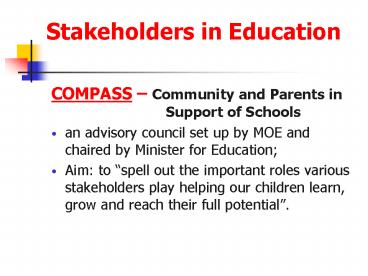Stakeholders in Education - PowerPoint PPT Presentation
1 / 18
Title:
Stakeholders in Education
Description:
an advisory council set up by MOE and chaired by Minister for Education; ... Parents may abrogate' responsibilities e.g. to tutors. Social Capital ... – PowerPoint PPT presentation
Number of Views:6172
Avg rating:3.0/5.0
Title: Stakeholders in Education
1
Stakeholders in Education
- COMPASS Community and Parents in Support of
Schools - an advisory council set up by MOE and chaired
by Minister for Education - Aim to spell out the important roles various
stakeholders play helping our children learn,
grow and reach their full potential.
2
Stakeholders in Education
- Students
- Parents/Grandparents
- Teachers
- Principals
- MOE HQ
- Community
- Business/Industry
- Alumni Associations
- School Advisory/Management Committee
3
Key Premises
- Education is not just the responsibility of
schools and teachers - Education is a social endeavour
- All sections of society have a shared
responsibility - These different responsibilities can be itemised
- Stakeholders will work in partnership.
4
MOE Mission Statement
- We can only succeed in our mission with the
full support of parents and the community. We
seek to work together with them as partners, to
develop our children to their fullest potential. - (My emphasis.)
5
Lecture Aims
- (not to work through the Stakeholder document)
- Aims are to
- Put the document into a policy context
- Explore two key underlying assumptions in the
light of available research - Comment on some of the challenges that it poses.
6
Policy Context
- One of a number of recent MOE initiatives
- bringing the education system into line with the
needs of a modern/ postmodern society in a
globalised world - Specifically, these initiatives seek to
- Develop the broader range of talents required by
Singapore as a global city - Address likely social problems associated with
cultural globalisation e.g. family stability,
national identity and loyalty social cohesion.
7
Notions of educability innate ability
- All children can learn and succeed remarkable
shift over the century in ideas about ability. - Early psychometric studies
- Heredity and environment debate
- 60-80 of measured intelligence thought to be
passed on in genes - Notion of a limited pool of intelligence
- Achievement thought to depend primarily on innate
abilities - Exclusion of parents.
8
Social Dimension of Ability
- Sociological research on inequalities
- Social class differences
- Wastage of talent
- Meritocracy and equality of educational
opportunity.
9
Explanations
- Material Deprivation
- e.g. poverty overcrowding long hours at
- work poor health unemployment
- Cultural Deprivation
- e.g. values interest encouragement
- books language cultural pursuits
10
Cultural Capital
- educated parents help children with school work
knowledge of education system - place to study, books, cultural artifacts
- conversation, discussion
- high value attached to education
- management of time e.g. t.v. and pastimes
- parents set a good example
- P. Bourdieu
11
Educational and Social Reproduction
CHILDREN
PARENTS
12
Social Change and the Family
- Brad and Jennifer
- US Trends
- high divorce rates
- single parent families
- serial marriages
- cohabitation and partners
- two parent working families.
13
Social Change and the Family
- The Permeable Family (Elkind)
- Key feature parents main preoccupation is
self-fulfillment - Mothers, especially, have to balance career and
home or choose between them - Parents may abrogate responsibilities e.g. to
tutors.
14
Social Capital
- Relationships in the home and social networks
- cultural capital in home is only transmitted when
social capital is high - Parents, esp. those with low cultural capital,
need the support of social networks. - J.S.Coleman
15
Examples of Social Capital
- parental interest and encouragement
- home-school relations
- schools as second homes
- self-help groups and community associations
- Mendaki
- Sinda
- CDAC.
16
Stakeholders some challenges
- wider society must be involved in socialisation
of young - young must be involved in wider society
- Recent schemes include CIPs and Learning Journeys
TV programme - Improvements in parent-school relations long
overdue - Mindset of teachers and parents needs to change.
17
Schools that go the extra mile
- See recent NIE-ULIE study
- Mortimore, P. (et al.) (2000),
- The Culture of Change Case Studies of
Improving Schools in Singapore and London.
18
Why Compass?
- All pointing in the same direction?
- The learning journey is a continuous one that
is reinforced both at home, in schools and among
those we relate to.































